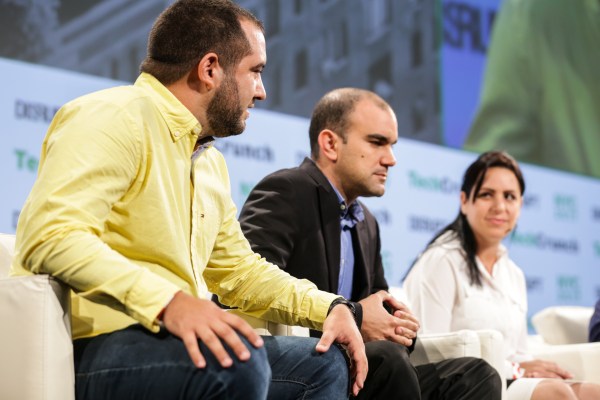As Cuba becomes more accessible, entrepreneurs there are finding new ways to reach users and build businesses. Today at TechCrunch Disrupt NY, we got the perspective of a trio of Cuban entrepreneurs to learn about the challenges they face in building businesses as the country gradually opens up to the outside world.
“I feel like Cuba has the key resource of the world. We have the human resource,” Kewelta founder Carlos Manuel García Vergara said on the panel. “In Cuba we have very talented people but we have no internet so we need to create offline.”
Kewalta is building a social ad network in a place that has limited connectivity. Instead of paying for ads, the idea is to get users to create profiles where they share the things they are interested in.
The need for offline experiences has led to the creation of “El Paquete Semanal” or just “el paquete,” which is a way for Cubans to exchange the latest information and content from the outside world. Some might consider a way to spread “pirated” content by transferring gigabytes worth of content through the exchange of hard drives. But without a robust digital network, it’s one reliable way for Cubans to know what’s happening beyond its borders.
Diana Elianne Benitez Perera founded Knales as a way to keep Cubans up to date. Using a combination of email and SMS, Knales send users updates on things like sports, weather and world news.
“We don’t have internet,” Perera said. “So we have to create first-world conditions in a third-world country.”
[gallery ids="1490294,1490297,1490288,1490287,1490300,1490299"]
As they grow, the entrepreneurs on stage said they mainly just want support from tech entrepreneurs in the U.S. and elsewhere. Perera, for instance, said she’s not looking for investors but mentorship from founders and entrepreneurs who have successfully built businesses that she can model her own after.
“I just want you to help me learn about this world,” she said. “I want to know what a startup is and what we need to do to get bigger.”
Meanwhile Vergara is looking for more support from U.S.-based tech companies as Cuba starts to come online.
“We need to talk to internet companies in the U.S. because when they see we are accessing their networks from the Cuban IP address, they shut us down,” Vergara said. “We’re talking to the government… but we need support from the whole entrepreneur community.”
